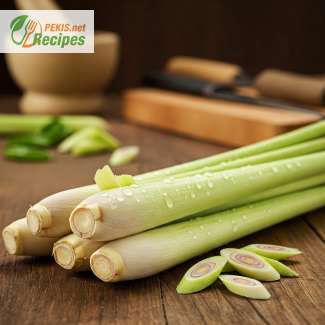
Discovering Lemongrass: A Versatile and Beneficial Herb
What is Lemongrass? An In-Depth Overview
Lemongrass (Cymbopogon citratus) is a fragrant, tropical plant known for its citrusy aroma and flavor. It is widely used in culinary, medicinal, and aromatherapy applications, particularly in Southeast Asian cuisine, where it plays a vital role in curries, soups, teas, and marinades. With its long, slender stalks, lemongrass resembles scallions but has a woody texture that requires proper preparation before consumption.
Belonging to the Poaceae (grass) family, lemongrass thrives in warm, humid climates and is cultivated in regions such as India, Sri Lanka, Thailand, and Indonesia. It is also widely used in essential oil production, thanks to its high citral content, which contributes to its antibacterial, antifungal, and insect-repellent properties.
Distinctive Features of Lemongrass
Lemongrass is characterized by several notable features, making it an essential herb for culinary and medicinal use:
- Appearance: The plant has long, narrow green leaves and stiff, pale green stalks with a bulbous base.
- Aroma & Flavor: Lemongrass exudes a strong lemony scent with subtle floral and earthy undertones.
- Texture: While the outer layers are tough and fibrous, the inner portion is soft and juicy, making it ideal for cooking.
- Growth Habit: It grows in dense, bushy clusters, reaching up to 3-5 feet in height.
- Nutritional Profile: Rich in antioxidants, vitamins, and essential minerals, lemongrass offers a range of health benefits.
- Medicinal Properties: Traditionally used in herbal medicine, lemongrass is known for its anti-inflammatory, antimicrobial, and digestive-supportive effects.
How Much Lemongrass Paste Equals One Stalk?
Lemongrass paste is a convenient alternative to fresh lemongrass stalks, especially when the fresh herb is unavailable. One tablespoon of lemongrass paste is approximately equivalent to one fresh stalk, though this may vary depending on the brand and consistency of the paste. The paste offers an intense, concentrated flavor, making it suitable for use in soups, curries, and marinades.
How to Dry Lemongrass Stalks
Drying lemongrass is an excellent way to preserve its flavor for long-term use. The drying process involves:
- Harvesting & Cleaning: Trim off any damaged or brown leaves, rinse the stalks thoroughly, and pat them dry.
- Chopping: Cut the stalks into small segments for quicker drying.
- Drying Methods:
- Air Drying: Bundle the stalks together and hang them in a warm, well-ventilated area for 7-10 days.
- Oven Drying: Spread the chopped pieces on a baking sheet and bake at 140°F (60°C) for 2-3 hours.
- Dehydrator: Use a food dehydrator at 95-115°F (35-45°C) until completely dry.
- Storage: Once dried, store the lemongrass pieces in an airtight container away from moisture and direct sunlight.
Why is Lemongrass Used?
Lemongrass serves multiple purposes across various industries, including:
- Culinary Applications: Used in soups, stews, teas, curries, and stir-fries for its distinct flavor.
- Medicinal Use: Supports digestion, relieves inflammation, and boosts immunity.
- Aromatherapy & Essential Oils: Extracted for its calming, stress-reducing properties.
- Cosmetics & Skincare: Found in soaps, lotions, and perfumes due to its antimicrobial qualities.
- Insect Repellent: Naturally repels mosquitoes and pests due to its citral content.
How to Use Lemongrass?
Lemongrass is incorporated into dishes in several ways:
- Fresh Stalks: Used in broths, teas, and infusions (remove before serving).
- Chopped or Minced: Ideal for curries, marinades, and stir-fries.
- Lemongrass Paste: Convenient for adding flavor to sauces and dressings.
- Dried Lemongrass: Used in teas and spice blends.
- Essential Oils: Applied in skincare products and aromatherapy.
Health Benefits of Lemongrass
Lemongrass offers numerous health advantages, including:
- Rich in Antioxidants
- Aids Digestion & Relieves Bloating
- Supports Immune Function
- Promotes Healthy Skin
- May Help Reduce Stress & Anxiety
How Does Lemongrass Work?
Lemongrass exerts its benefits through active compounds like citral, which contribute to its antibacterial and anti-inflammatory effects. When ingested, it helps stimulate digestion and detoxify the body. In aromatherapy, it calms the nervous system, reducing stress and tension.
Biggest Secrets for Using Lemongrass
- Pound the stalks before using them to release maximum flavor.
- Pair it with coconut milk for authentic Southeast Asian dishes.
- Infuse into syrups or cocktails for a unique citrusy twist.
Why is Lemongrass Perfect for Recipes?
Lemongrass adds depth and brightness to dishes with its refreshing citrus aroma and subtle spiciness. It complements seafood, poultry, and vegetables, making it a staple in global cuisines.
Home Cultivation and Growth Guide
Lemongrass is easy to grow at home with the following steps:
- Choose a warm, sunny spot.
- Plant in well-draining soil.
- Water regularly but avoid overwatering.
- Harvest when stalks reach maturity.
How to Grow Lemongrass from a Stalk
- Place a fresh stalk in water until roots appear.
- Transfer to soil and water consistently.
- Watch it flourish in a few weeks.
Can You Freeze Lemongrass Stalks?
Yes! Simply chop and freeze lemongrass stalks in an airtight container for up to 6 months.
Nutritional Values of Lemongrass
- Low in Calories
- Rich in Fiber
- Contains Vitamin A, C, & B Complex
- Packed with Essential Minerals (Magnesium, Potassium, Iron)
Vitamins and Minerals in Lemongrass
Lemongrass is a nutritional powerhouse, offering:
- Vitamin C – Supports immunity
- Folate – Essential for cell growth
- Potassium – Regulates blood pressure
- Magnesium – Aids muscle function
Why Lemongrass is a Must-Have
Lemongrass is a versatile, flavorful herb with culinary, medicinal, and therapeutic applications. Whether you use it in recipes, herbal remedies, or aromatherapy, its numerous benefits make it an essential addition to any home.
With its distinct citrus flavor, health-enhancing properties, and ease of cultivation, lemongrass proves to be a timeless ingredient cherished worldwide.